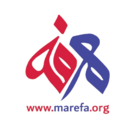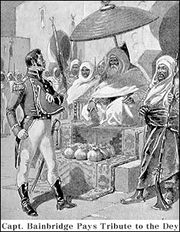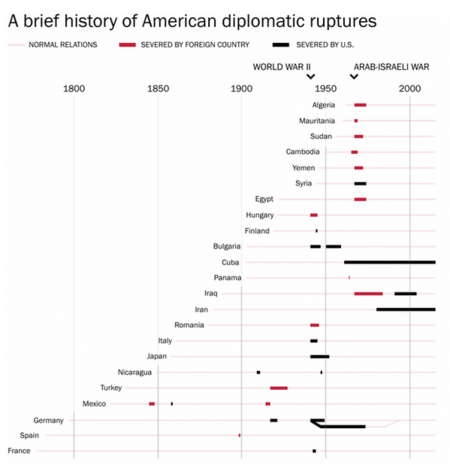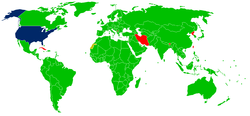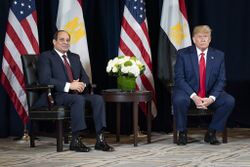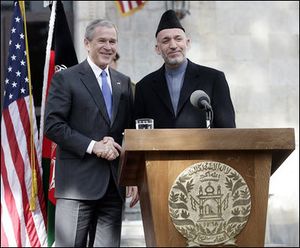السياسة الخارجية للولايات المتحدة
| هذا المقال جزء من سلسلة عن |
| سياسة الولايات المتحدة |
|---|
 |
السياسة الخارجية للولايات المتحدة بالغة التأثير في المسرح العالمي، لكونها قوة عظمى. ويدعم قوة أمريكا اقتصاد قدره 13 تريليون دولار.الأهداف الرسمية المعلنة للسياسة الخارجية للولايات المتحدة، كما يحددها جدول أعمال وزارة الخارجية الأمريكية، هي "خلق عالم أكثر أمناً وديمقراطية ورخاءً لصالح الشعب الأمريكي والمجتمع العالمي."[1] بالإضافة لذلك، تذكر لجنة العلاقات الخارجية بمجلس النواب الأمريكي بعضاً من الأهداف في دائرة اختصاصها: "قيود التصدير، بما فيه منع انتشار الالتكنولوجيا النووية والعتاد النووي؛ واجراءات تقوية التواصل التجاري مع الأمم الأخرى ولتأمين المصالح التجارية الأمريكية في الخارج؛ اتفاقيات السلع الدولية؛ التعليم في الخارج؛ وحماية المواطنين الأمريكان في الخارج و العامل في الخارج."[2] وقد كانت السياسة الخارجية الأمريكية موضع جدال واسع، وانتقاد ومديح في الداخل والخارج.
. . . . . . . . . . . . . . . . . . . . . . . . . . . . . . . . . . . . . . . . . . . . . . . . . . . . . . . . . . . . . . . . . . . . . . . . . . . . . . . . . . . . . . . . . . . . . . . . . . . . . . . . . . . . . . . . . . . . . . . . . . . . . . . . . . . . . . . . . . . . . . . . . . . . . . . . . . . . . . . . . . . . . . . .
قوة السياسة الخارجية للرئيس والكونجرس
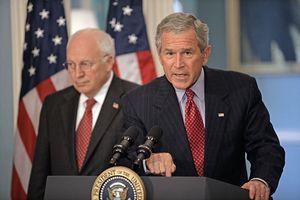
 مقالات مفصلة: Treaty Clause
مقالات مفصلة: Treaty Clause- فقرة سلطات الحرب
- فقرة التعيينات
- فقرة التجارة
تاريخ مختصر
القرن الثامن عشر
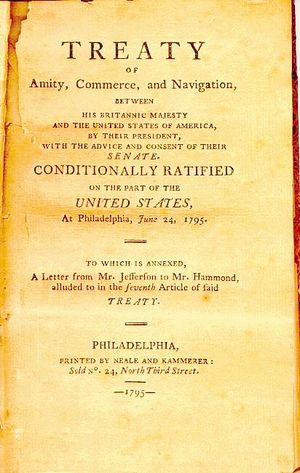
1898 - الوقت الحالي
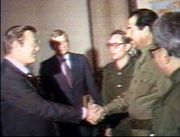
قانون السياسة الخارجية
المعاهدات والإتفاقيات التنفيذية في الكونغرس
القانون المحلي ضد القانون الدولي
العلاقات الدبلوماسية
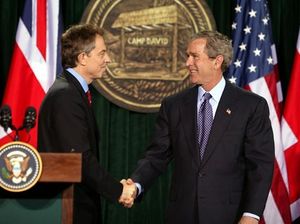
تمتاز الولايات المتحدة الأمريكية بقاعدة واسعة من العلاقات الدبلوماسية الدولية أكثر من أي بلد آخر. ويوجد تقريبا سفارة في كل دولة في العالم سفارة للولايات المتحدة وسفارة للدولة في واشنطن. ويوجد عدد قليل من الدول والتي لا يوجد لها علاقات دبلوماسية رسمية مع الولايات المتحدة وهي:
 بوتان (السفارة الأمريكية في نيو دلهي، الهند لها مهام قنصلية لبوتان)[5]
بوتان (السفارة الأمريكية في نيو دلهي، الهند لها مهام قنصلية لبوتان)[5] كوبا
كوبا إيران (سفير سويسرا يعمل كوسيط بين الولايات المتحدة وإيران)
إيران (سفير سويسرا يعمل كوسيط بين الولايات المتحدة وإيران) قبرص الشمالية *
قبرص الشمالية * كوريا الشمالية
كوريا الشمالية جمهورية الصين * (المعهد الأمريكي في تايوان، تحت قانون العلاقات مع تايوان، هو سفارة الأمر الواقع الأمريكية)
جمهورية الصين * (المعهد الأمريكي في تايوان، تحت قانون العلاقات مع تايوان، هو سفارة الأمر الواقع الأمريكية) الجمهورية العربية الصحراوية الديمقراطية (الصحراء الغربية) *
الجمهورية العربية الصحراوية الديمقراطية (الصحراء الغربية) *
. . . . . . . . . . . . . . . . . . . . . . . . . . . . . . . . . . . . . . . . . . . . . . . . . . . . . . . . . . . . . . . . . . . . . . . . . . . . . . . . . . . . . . . . . . . . . . . . . . . . . . . . . . . . . . . . . . . . . . . . . . . . . . . . . . . . . . . . . . . . . . . . . . . . . . . . . . . . . . . . . . . . . . . .
الحلفاء
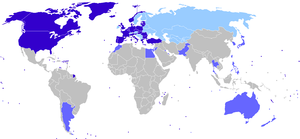
الخليج العربي
أفريقيا
شمال أفريقيا
| البلد | بدء العلاقات الرسمية | ملاحظات |
|---|---|---|
| 1962[7] | See Algeria–United States relations
The official US presence in Algeria is expanding following over a decade of limited staffing, reflecting the general improvement in the security environment. During the past three years, the US embassy has moved toward more normal operations and now provides most embassy services to the American and Algerian communities. | |
| 1922[8] | See Egypt–United States relations
After the 1973 Arab-Israeli War, Egyptian foreign policy began to shift as a result of the change in Egypt's leadership from President Gamal Abdel-Nasser to Anwar Sadat and the emerging peace process between Egypt and Israel. Sadat realized that reaching a settlement of the Arab-Israeli conflict is a precondition for Egyptian development. To achieve this goal, Sadat ventured to enhance Egypt–United States relations to foster a peace process with Israel. | |
| 1951[9] | See Libya–United States relations
In 2011, the United States cut diplomatic relations with the Gaddafi regime. The United States recognized the National Transitional Council as the legitimate government of Libya on July 15, 2011.[10] | |
| 1786[11] | See Morocco–United States relations
Morocco was the first sovereign nation to recognize the United States in 1777. American-Moroccan relations were formalized in a 1786 treaty, which is still in force and is the oldest unbroken bilateral treaty in American history. | |
| 1956[12] | See Sudan–United States relations | |
| 1795[13] | See Tunisia–United States relations | |
| See Arab–American relations
The Arab League has a representation headquarter, and several offices in the U.S. |
أفريقيا جنوب الصحراء
| البلد | بدء العلاقات الرسمية | الملاحظات |
|---|---|---|
| 1994[14] | انظر Angola–United States relations
Relations were tense during the Angolan Civil War when the US government backed UNITA rebels, but have warmed since the Angolan government renounced Marxism in 1992. | |
| 1960[15] | See Benin–United States relations
The two nations have had an excellent history of relations in the years since Benin embraced democracy. The US government continues to assist Benin with the improvement of living standards that are key to the ultimate success of Benin's experiment with democratic government and economic liberalization, and are consistent with US values and national interest in reducing poverty and promoting growth. The bulk of the US effort in support of consolidating democracy in Benin is focused on long-term human resource development through USAID programs.[16] | |
| 1966[17] | See Botswana–United States relations | |
| 1960[18] | See Burkina Faso–United States relations | |
| 1962[19] | See Burundi–United States relations | |
| 1960[20] | See Cameroon–United States relations | |
| 1975[21] | See Cape Verde–United States relations | |
| 1960[22] | See Central African Republic–United States relations | |
| 1960[23] | See Chad–United States relations | |
| 1977[24] | See Comoros–United States relations | |
| 1960[25] | See Côte d'Ivoire–United States relations | |
| 1960[26] | See Democratic Republic of the Congo–United States relations | |
| 1977[27] | See Djibouti–United States relations | |
| 1968[28] | See Equatorial Guinea–United States relations | |
| 1993[29] | See Eritrea–United States relations | |
| 1968[30] | See Eswatini–United States relations | |
| 1903[31] | See Ethiopia–United States relations | |
| 1960[32] | See Gabon–United States relations | |
| 1957[33] | See Ghana–United States relations | |
| 1959[34] | See Guinea–United States relations | |
| 1975[35] | See Guinea-Bissau–United States relations | |
| 1964[36] | See Kenya–United States relations | |
| 1966[37] | See Lesotho–United States relations | |
| 1864[38] | See Liberia–United States relations | |
| 1874[39] | See Madagascar–United States relations | |
| 1964[40] | See Malawi–United States relations | |
| 1960[41] | See Mali–United States relations | |
| 1960[42] | See Mauritania–United States relations | |
| 1968[43] | See Mauritius–United States relations | |
| 1975[44] | See Mozambique–United States relations | |
| 1990[45] | See Namibia–United States relations | |
| 1960[46] | See Niger–United States relations | |
| 1960[47] | See Nigeria–United States relations | |
| 1960[48] | See Republic of the Congo–United States relations | |
| 1962[49] | See Rwanda–United States relations | |
| 1976[50] | See São Tomé and Príncipe–United States relations | |
| 1960[51] | See Senegal–United States relations | |
| 1976[52] | See Seychelles–United States relations | |
| 1961[53] | See Sierra Leone–United States relations | |
| 1960[54] | See Somalia–United States relations | |
| 1929[55] | See South Africa–United States relations | |
| 2011[56] | See South Sudan–United States relations | |
| 1961[57] | See Tanzania–United States relations | |
| 1965[58] | See The Gambia–United States relations | |
| 1960[59] | See Togo–United States relations | |
| 1962[60] | See Uganda–United States relations
Bilateral relations between the United States and Uganda have been good since Yoweri Museveni assumed power, and the United States has welcomed his efforts to end human rights abuses and to pursue economic reform. Uganda is a strong supporter of the Global War on Terror. The United States is helping Uganda achieve export-led economic growth through the African Growth and Opportunity Act and provides a significant amount of development assistance. At the same time, the United States is concerned about continuing human rights problems and the pace of progress toward the establishment of genuine political pluralism. | |
| 1964[61] | See United States–Zambia relations
The diplomatic relationship between the United States and Zambia can be characterized as warm and cooperative. The United States works closely with the Zambian Government to defeat the HIV/AIDS pandemic that is ravaging Zambia, to promote economic growth and development, and to effect political reform needed to promote responsive and responsible government. The United States is also supporting the government's efforts to root out corruption. Zambia is a beneficiary of the African Growth and Opportunity Act (AGOA). The US government provides a variety of technical assistance and other support that is managed by the Department of State, USAID, Millennium Challenge Corporation (MCC) Threshold Program, Centers for Disease Control and Prevention, Department of the Treasury, Department of Defense, and the Peace Corps. The majority of US assistance is provided through the President's Emergency Plan for AIDS Relief (PEPFAR), in support of the fight against HIV/AIDS. | |
| 1980[62] | See United States–Zimbabwe relations
After Morgan Tsvangirai, Mugabe's rival and leader of the Movement for Democratic Change, became Prime Minister of Zimbabwe under a power-sharing agreement, the Barack Obama administration extended its congratulations to Tsvangirai, but said that the US would wait for evidence of Mugabe's cooperation with the MDC before it would consider lifting its sanctions.[63] In early March 2009, Obama proclaimed that US sanctions would be protracted provisionally for another year, because Zimbabwe's political crisis is as yet unresolved.[64] |
. . . . . . . . . . . . . . . . . . . . . . . . . . . . . . . . . . . . . . . . . . . . . . . . . . . . . . . . . . . . . . . . . . . . . . . . . . . . . . . . . . . . . . . . . . . . . . . . . . . . . . . . . . . . . . . . . . . . . . . . . . . . . . . . . . . . . . . . . . . . . . . . . . . . . . . . . . . . . . . . . . . . . . . .
آسيا الوسطى
 مقالة مفصلة: اللعبة الكبرى الجديدة
مقالة مفصلة: اللعبة الكبرى الجديدة
ظهر بعد استقلال تلك الدول كتاب يعتبره أغلب المحللين الاستراتيجيين مهمًا؛ لأنه يكشف الخطوط الرئيسة لاهتمامات الإدارة الأمريكية بتلك المنطقة، وهو كتاب "زبيگنيو بريجنسكي"- مستشار الأمن القومي الأمريكي السابق- المسمى: "رقعة الشطرنج الكبرى.. الأولوية الأمريكية ومتطلباتها الجيوستراتيجية عام 1997"، ويشير بريجنسكي إلى هذه المنطقة في إشارتين: الأولى طرح خطوتين أساسيتين لما سماه صياغة الجيوستراتيجيا اللازمة للإدارة طويلة الأمد لمصالح أمريكا الجيوبوليتكية في أوراسيا، وهي– حسب رأيه- كالتالي[65]:
- أولاً
- تحديد الدول الأوراسية التي تمتلك القوة لإحداث تحول في التوزيع الدولي للقوى، ومعرفة أهدافها.
- ثانيًا
- صياغة سياسات أمريكية محددة لمعادلة ومشاركة الدول أعاه أو السيطرة عليها على النحو الذي يحافظ على المصالح الحيوية الأمريكية. والإشارة الثانية لبريجنسكي هو عرضه لمراكز النفوذ العالمية في أزمنة مختلفة من الشعوب التي تقطن أوراسيا، إذ يقدم أطروحته باعتبار أوربا وآسيا قارة واحدة يسميها أوراسيا، وبالأخص القادمة من طرفها الغربي وإخضاعها بقية العالم لسيطرتها، وبذلك تحصل على مكانة خاصة، وتتمتع بامتيازات كونها القوة الأولى في العالم. ووفق هذه الأهمية الأمريكية لمنطقة آسيا الوسطى، فقد وضعت واشنطن استراتيجية للهيمنة على ثروات تلك المنطقة، وخاصة البترول والغاز وفق أربعة ركائز:
- تعدد مصادر النفط والطاقة عمومًا، فبدلاً من الاعتماد بصفة أساسية على بترول منطقة الخليج العربي الذي يشكل حوالي ثلثي الاحتياطي العالمي من النفط أصبح هناك بترول بحر قزوين الذي يقدر مخزونه بحوالي 200 مليار برميل.
- تعدد طرق النقل وخطوط الإمداد، فلا يكفي تعدد المصادر، بل يجب تعدد المسارات لتقليل احتمال تعرضها للمخاطر، ومن هنا كان رفض واشنطن القاطع لمرور خط قزوين بإيران رغم قلة تكاليفه؛ لأنه في النهاية سيصب في الخليج العربي ليمر بناقلاته مع بترول الخليج عبر مضيق هرمز، فتزداد مخاطر تأثير أي صراعات أو تغيرات في الخليج على إمدادات المصدرين معًا للسبب ذاته، رفضت واشنطن مرور الخط بروسيا، فالبحر الأسود فمضيق البسفور.
- الحصول على النفط بأسعار مناسبة (أي رخيصة)، وهو ما يوفره تعدد المصادر، وتعدد الطرق الآمنة.
- حرمان أعداء واشنطن من تكنولوجيا النفط، حيث أضاف الكونگرس الأمريكي عام 1997 بعدًا رابعًا للاستراتيجية الأمريكية للنفط، وهو حرمان ( الدول المتمردة ) على واشنطن، وعلى رأسها إيران من تطوير صناعتها النفطية، أي الاستفادة من عمليات نقل الطاقة عبر تحصيل رسوم على الكميات التي تنقل عبر أراضيها، ولذا كان الموقف الصلب لواشنطن من مرور خط قزوين عبر إيران.
وجدير بالذكر أن أغلب الساسة الأمريكان منذ إدارة كلينتون وجهوا عنايتهم لتوجيه أنظار واشنطن لدول تلك المنطقة، ومنهم ستروب تالبوت، نائب وزير الخارجية الأمريكي السابق، في خطاب له، ضمن أنشطة مركز آسيا الوسطى والقوقاز، أن المحور الثالث يعد الأبرز في السياسة الأمريكية حيال المنطقة، إذ يقول: (( منذ أن تولى فريق بيل كلينتون، الرئيس الأمريكي السابق، الإدارة كان خطابه واضحًا إزاء دول المنطقة، فيقدر تقدم تلك الدول في اتجاه الحريات السياسية والاقتصادية، واتجاه المصالحة الوطنية والدولية ستكون الولايات المتحدة إلى جانبها. وفي نفس الاتجاه، فقد عرض تالبوت الاستراتيجية الأمريكية للتواجد في المنطقة أو اختراقها، والهيمنة عليها التي تقوم على الأسس التالية:
- تطوير الديمقراطية
- خلق اقتصاد السوق الحرة
- احتضان السلم والتعاون بين دول المنطقة
- إدماج دول المنطقة في منظومة المجتمع الدولي
ولابد من القول أن اللاعب الأمريكي في آسيا الوسطى ظل همه الأول ازدياد النفوذ الروسي في تلك الدول، إلا أن بعض مراكز الأبحاث الأمريكية قللت من النفوذ الروسي، وتشجيع صانع القرار الأمريكي للانفراد بآسيا الوسطى بموجب عدة معطيات، وكما يذكرها الباحث المصري عاطف عبد الحميد، وهي:
- أن آسيا الوسطى ستظل بعيدة عن تأثير موسكو عسكريًا؛ نظرًا لانشغال المؤسسة العسكرية الروسية بمعضلات تبدأ من الحيرة في اتخاذ قرار بتحويل الجيش المترهل إلى مؤسسة محترفة، وتنتهي عند مشكلة صرف معاشات جيش من الضباط والعسكريين المتقاعدين.
- أن اقتصاد السوق الذي تنتظره آسيا الوسطى لن تقدمه اليد الروسية المغلولة داخليًا بمواجهة الحيتان الكبرى التي تنهب البلاد سواء من رجال الأعمال، أو من رجال الدولة.
- أن الحرية الإعلامية والفكرية التي تطلبها أحزاب المعارضة، والشعوب في آسيا الوسطى لا توجد في روسيا، ويكفي أن يراجع المرء وسائل الإعلام الروسية عقب سقوط النظام في قرغيزستان ليجد تحليلات باهتة، بعيدة عن العمق، كان أقصى ما وصلت إليه ترجمة ما نشرته وسائل الإعلام الغربية عن الدعم الأمريكي للمعارضة القرغيزية.
العلاقات مع أمريكا اللاتينية
پورتو ريكو
المخدرات غير المشروعة
المساعدات العسكرية
الدرع الصاروخي
النزاعات الإقليمية
تاريخ تصدير الديموقراطية من خلال التدخل العسكري
رأي بأن التدخل الأمريكي لا يصدر الديموقراطية
رأي بإختلاط نتائج التدخل الأمريكي
رأي حول فعالية التدخل الأمريكي في تصدير الديموقراطية
نقد
الدعم
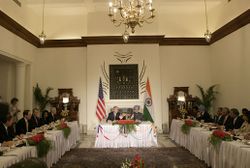
تحليل نايل الشافعي
ترتكز السياسة الخارجية الأمريكية إلى عدد من المبادئ:
Good cop, bad cop تقسيم الأدوار
حيث نجد:
- الكونجرس باستمرار (تقريبا) يلعب دور الرجل الشرير، وهذا الدور يتيح للكونجرس تمثيل كل المصالح المعتملة بالمجتمع، من شركات وجماعات ضغط، ...
- الآراء السياسية للبنتاجون تتسم بالتأني والمحافظة.
- وزارة الخارجية تلعب دوراً تقدمياً (حتى في الإدارات الجمهورية، مثل تلرسون بإدارة ترمب)
- مجتمع المخابرات
- الأمن القومي
- البيت الأبيض يأتي في دور الفيصل والحكم.
Brinkmanship سياسة حافة الهاوية
استناداً إلى مخزون القوة الكبير نسبياً (بالمقارنة بباقي العالم مجتمعاً) تعتمد السياسة الخارجية الأمريكية الإقدام منهجاً لتحقيق أكبر مكاسب ممكنة. فحتى إذا ما فشل موقف ما، فلن تخسر أمريكا كثيراً بالتراجع عن ذلك الموقف واعتماد موقف آخر. ما قد يراه البعض من فقدان ماء الوجه أو الرأي العام العالمي، هو ليس بوارد في صناعة القرار الأمريكي. المهم هو فقط الرأي العام الأمريكي، وهنا يأتي دور الإعلام في "خلق الموافقة manufacturing consent".
انظر أيضا
- Advice and consent
- الإمبراطورية الأمريكية
- البعثات الدبلوماسية الأمريكية
- التدخلات الأمريكية في الشرق الأوسط
- مذهب كارتر
- القنصلية والعلاقات الخارجية
- سياسة الطاقة للولايات المتحدة
- Extraordinary rendition by the United States
- خطاب وداع جورج واشنطن
- غزو العراق 2003
- List of joint US-Bulgarian military bases
- List of United States military history events
- الناتو
- Reid v. Covert
- Special relationship
- خط زمني للتاريخ الدبلوماسي للولايات المتحدة
- Treaty Clause
- الولايات المتحدة والأمم المتحدة
- United States, Chanceries of Foreign Governments
- مقاتل غير قانوني
قراءات إضافية
تاريخ تصدير الديموقراطية
- Barro, Robert J. (2002). "Democracy in Afghanistan: Don't Hold Your Breath". Hoover Digest (2).
{{cite journal}}: Cite has empty unknown parameter:|coauthors=(help); Unknown parameter|month=ignored (help)* - Matthew J. Morgan A Democracy is Born: An Insider's Account of the Battle Against Terrorism in Afghanistan 2008
- Carothers, Thomas (2003). "Promoting Democracy and Fighting Terror". Foreign Affairs: 84.
{{cite journal}}: Cite has empty unknown parameter:|coauthors=(help); Unknown parameter|month=ignored (help)* - Diamond, Larry (2004). "The Long Haul". Hoover Digest (2).
{{cite journal}}: Cite has empty unknown parameters:|month=and|coauthors=(help)* - Forsythe, David P. (2000). "U.S. Foreign Policy and Enlarging the Democratic Community" ([dead link] - Scholar search). Human Rights Quarterly. 22 (4): 988–1010. doi:10.1353/hrq.2000.0043.
{{cite journal}}: Cite has empty unknown parameters:|month=and|coauthors=(help); External link in|format= - Gleditsch, Nils Petter (2004). "Democratic Jihad? Military Intervention and Democracy". Paper presented at the workshop on Resources, Governance Structure and Civil War, Uppsala, Sweden.
{{cite journal}}: Unknown parameter|coauthors=ignored (|author=suggested) (help); Unknown parameter|month=ignored (help) Finds that democratization is unpredictable in the long-term. - Hay, William Anthony (2006). "Can Democracy Be Imposed from the Outside?". Foreign Policy Research Institute (FPRI).
{{cite journal}}: Cite has empty unknown parameter:|coauthors=(help); Unknown parameter|month=ignored (help) Alternative link. International history of exporting democracy. In the United States after idealism fails, the goal becomes a realist focus on stability and the protection of American interests. - Hermann, Margaret G. (1998). "The U.S. Use of Military Intervention to Promote Democracy: Evaluating the Record". International Interactions. 24 (2): 91–114. doi:10.1080/03050629808434922.
{{cite journal}}: Unknown parameter|coauthors=ignored (|author=suggested) (help); Unknown parameter|month=ignored (help) Uses Herbert K. Tillema, Foreign Overt Military Interventions, 1945-1991: OMILIST Codebook, University of Missouri, Columbia, MO; 1997. - Krasner, Stephen D. (2003). "We Don't Know How To Build Democracy". Los Angeles Times.
{{cite journal}}: Cite has empty unknown parameter:|coauthors=(help); Unknown parameter|month=ignored (help)* - Lawson, Chappell (2003). "Democracy? In Iraq?". Hoover Digest. 3 (3).
{{cite journal}}: Cite has empty unknown parameter:|month=(help); Unknown parameter|coauthors=ignored (|author=suggested) (help) This study points to 19 cases of U.S. intervention "in the last century," including Afghanistan, Austria, Bosnia-Herzegovina, Cambodia, Cuba, the Dominican Republic, Germany, Grenada, Haiti, Japan, the Marshall Islands, Micronesia, Nicaragua, Palau, Panama, the Philippines, Somalia, South Korea, and South Vietnam. In half of these cases democratic institutions remained, in the other half they did not. To determine the success of Iraq becoming a democracy, this study uses data compiled by Freedom House measuring democracy in 186 countries, during four years, the years 1996 through 2000. - Lowenthal, Abraham F. (March 1, 1991). Exporting Democracy : The United States and Latin America. The Johns Hopkins University Press. ISBN 0-8018-4132-1.
{{cite book}}: Cite has empty unknown parameter:|coauthors=(help) - Meernik, James (1996). "United States Military Intervention and the Promotion of Democracy". Journal of Peace Research. 33 (4): 391–402. doi:10.1177/0022343396033004002.
{{cite journal}}: Cite has empty unknown parameters:|month=and|coauthors=(help) - Pei, Samia Amin (2004). "Why Nation-Building Fails in Mid-Course". International Herald Tribune.
{{cite journal}}: Unknown parameter|coauthors=ignored (|author=suggested) (help); Unknown parameter|month=ignored (help) The study finds that democracies built by the U.S. begin to unravel in the decade after U.S. forces depart, because political elites begin to change the law to fit their own interests. This study points to 14 cases of U.S. intervention in the twentieth century. - Peceny, Mark (1999). Democracy at the Point of Bayonets. University Park:Pennsylvania State University Press. ISBN 0-271-01883-6.
{{cite book}}: Cite has empty unknown parameter:|coauthors=(help) This book finds that when the U.S. interventions later supported elections, the democracy was more likely to succeed. This study points to 25 cases of U.S. intervention between 1898 and 1992.- Review: Shifter, Michael (2001). "Democracy at the Point of Bayonets". Latin American Politics and Society. 43: 150. doi:10.2307/3177036.
{{cite journal}}: Cite has empty unknown parameter:|coauthors=(help); Unknown parameter|month=ignored (help)
- Review: Shifter, Michael (2001). "Democracy at the Point of Bayonets". Latin American Politics and Society. 43: 150. doi:10.2307/3177036.
- Smith, Tony (1995). America's Mission: The United States and the Worldwide Struggle for Democracy in the Twentieth Century. Princeton University Press. ISBN 0-691-04466-X.
{{cite book}}: Unknown parameter|coauthors=ignored (|author=suggested) (help) - Tures, John A. "Operation Exporting Freedom: The Quest for Democratization via United States Military Operations" (PDF). Whitehead School of Diplomacy and International Relations.
{{cite journal}}: Cite has empty unknown parameters:|month=and|coauthors=(help)PDF file. This study points to 30 U.S. interventions between 1945 and 1991. Also uses Herbert K. Tillema, Foreign Overt Military Interventions, 1945-1991: OMILIST Codebook, University of Missouri, Columbia, MO; 1997. - Tures, John A. "To Protect Democracy (Not Practice It): Explanations of Dyadic Democratic Intervention (DDI) The Use of Liberal Ends to Justify Illiberal Means". OJPCR: The Online Journal of Peace and Conflict Resolution.
{{cite journal}}: Cite has empty unknown parameters:|month=and|coauthors=(help) - Matthew J. Morgan "The American Military after 9/11: Society, State, and Empire" 2008
وصلات خارجية
- Chris Zambelis and Brandon Gentry, "China Through Arab Eyes: American Influence in the Middle East," Parameters, Vol. XXXVIII, No. 1, Spring 2008, pp. 60-72. [1]
- "How the World Sees America", Amar C. Bakshi, "Washington Post/Newsweek", 2007.
- Getting beyond the Bush Doctrine, Edward A. Kolodziej, Center for Global Studies, December, 2006.
- A site critical of U.S. foreign policy during the last 60 years
- U.S. Political Parties and Foreign Policy, a Background Q&A by cfr.org, the website of the Council on Foreign Relations
- U.S. State Dept. Documentary: Foreign Relations of the United States
- Foreign Relations of the United States 1861-1960 (full text from the University of Wisconsin-Madison Libraries)
- Timeline of U.S. diplomatic history
- Introduction to U.S. foreign aid
- Foreign aid by country
- India as a New Global Power: An Action Agenda for the United States"
- An analysis of the strained love-hate relationship between U.S. and Pakistan by Prof. Adil Najam of the Fletcher School of Law and Diplomacy published in The News International
- Confidence in U.S. Foreign Policy Index Tracking survey of American public attitudes on foreign policy, conducted by Public Agenda with Foreign Affairs magazine.
- An interactive map of some examples of a sampling of U.S. Foreign Policy
- America and Taiwan, 1943-2004* * Analysis of Congressional-Executive Agreements (Article by Steve Charnovitz from the American Journal of International Law)
- Nixon's Visit to China and how it Began a New Sino-American Relationship
- A PDF file of the Congressional Research Service report, Library of Congress, Treaties and other International Agreements: the Role of the United States Senate
- National Endowment for Democracy
المصادر
- ^ US Dept of State - Foreign Policy Agenda
- ^ Committe on Foreign Affairs: U.S. House of Representatives
- ^ Bush to Russia: 'Bullying and intimidation are not acceptable', Los Angeles Times
- ^ U.S. past haunts Iraq war plans: reports detail U.S. weapons, intelligence aid to Saddam Hussein in '80s - World
- ^ [http://www.state.gov/r/pa/ei/bgn/35839.htm Article on Bhutan
- ^ Iraq: Oil and Economy
- ^ "Algeria - Countries - Office of the Historian". Retrieved February 19, 2015.
- ^ "Egypt - Countries - Office of the Historian". Retrieved February 19, 2015.
- ^ "Libya - Countries - Office of the Historian". Retrieved February 19, 2015.
- ^ "U.S. formally recognizes Libyan rebels as legitimate government". Kansas City star. July 15, 2011. Retrieved July 16, 2011.
- ^ "Morocco - Countries - Office of the Historian". Retrieved February 19, 2015.
- ^ "Sudan - Countries - Office of the Historian". Retrieved February 19, 2015.
- ^ "Tunisia - Countries - Office of the Historian". Retrieved February 19, 2015.
- ^ "Angola - Countries - Office of the Historian". Retrieved February 19, 2015.
- ^ "Benin (Dahomey) - Countries - Office of the Historian". Retrieved February 19, 2015.
- ^ "Background Note: Benin". US Department of State (June 2008).
 هذا المقال يضم نصاً من هذا المصدر، الذي هو مشاع.
هذا المقال يضم نصاً من هذا المصدر، الذي هو مشاع.
- ^ "Botswana - Countries - Office of the Historian". Retrieved February 19, 2015.
- ^ "Burkina Faso (Upper Volta) - Countries - Office of the Historian". Retrieved February 19, 2015.
- ^ "Burundi - Countries - Office of the Historian". Retrieved February 19, 2015.
- ^ "Cameroon - Countries - Office of the Historian". Retrieved February 19, 2015.
- ^ "Cape Verde - Countries - Office of the Historian". Retrieved February 19, 2015.
- ^ "Central African Republic - Countries - Office of the Historian". Retrieved February 19, 2015.
- ^ "Chad - Countries - Office of the Historian". Retrieved February 19, 2015.
- ^ "Comoros - Countries - Office of the Historian". Retrieved February 19, 2015.
- ^ "Cote D'Ivoire (Ivory Coast) - Countries - Office of the Historian". Retrieved February 19, 2015.
- ^ "Democratic Republic of the Congo - Countries - Office of the Historian". Retrieved February 19, 2015.
- ^ "Djibouti - Countries - Office of the Historian". Retrieved February 19, 2015.
- ^ "Equatorial Guinea - Countries - Office of the Historian". Retrieved February 19, 2015.
- ^ "Eritrea - Countries - Office of the Historian". Retrieved February 19, 2015.
- ^ "Eswatini - Countries - Office of the Historian". Retrieved February 19, 2015.
- ^ "Ethiopia - Countries - Office of the Historian". Retrieved February 19, 2015.
- ^ "Gabon - Countries - Office of the Historian". Retrieved February 19, 2015.
- ^ "Ghana - Countries - Office of the Historian". Retrieved February 19, 2015.
- ^ "Guinea - Countries - Office of the Historian". Retrieved February 19, 2015.
- ^ "Guinea-Bissau - Countries - Office of the Historian". Retrieved February 19, 2015.
- ^ "Kenya - Countries - Office of the Historian". Retrieved February 19, 2015.
- ^ "Lesotho - Countries - Office of the Historian". Retrieved February 19, 2015.
- ^ "Liberia - Countries - Office of the Historian". Retrieved February 19, 2015.
- ^ "Madagascar - Countries - Office of the Historian". Retrieved February 19, 2015.
- ^ "Malawi - Countries - Office of the Historian". Retrieved February 19, 2015.
- ^ "Mali - Countries - Office of the Historian". Retrieved February 19, 2015.
- ^ "Mauritania - Countries - Office of the Historian". Retrieved February 19, 2015.
- ^ "Mauritius - Countries - Office of the Historian". Retrieved February 19, 2015.
- ^ "Mozambique - Countries - Office of the Historian". Retrieved February 19, 2015.
- ^ "Namibia - Countries - Office of the Historian". Retrieved February 19, 2015.
- ^ "Niger - Countries - Office of the Historian". Retrieved February 19, 2015.
- ^ "Nigeria - Countries - Office of the Historian". Retrieved February 19, 2015.
- ^ "Republic of the Congo - Countries - Office of the Historian". Retrieved February 19, 2015.
- ^ "Rwanda - Countries - Office of the Historian". Retrieved February 19, 2015.
- ^ "Sao Tome and Principe - Countries - Office of the Historian". Retrieved February 19, 2015.
- ^ "Senegal - Countries - Office of the Historian". Retrieved February 19, 2015.
- ^ "Seychelles - Countries - Office of the Historian". Retrieved February 19, 2015.
- ^ "Sierra Leone - Countries - Office of the Historian". Retrieved February 19, 2015.
- ^ "Somalia - Countries - Office of the Historian". Retrieved February 19, 2015.
- ^ "South Africa - Countries - Office of the Historian". Retrieved February 19, 2015.
- ^ "South Sudan - Countries - Office of the Historian". Retrieved February 19, 2015.
- ^ "Tanzania - Countries - Office of the Historian". Retrieved February 19, 2015.
- ^ "The Gambia - Countries - Office of the Historian". Retrieved February 19, 2015.
- ^ "Togo - Countries - Office of the Historian". Retrieved February 19, 2015.
- ^ "Uganda - Countries - Office of the Historian". Retrieved February 19, 2015.
- ^ "Zambia - Countries - Office of the Historian". Retrieved February 19, 2015.
- ^ "Zimbabwe - Countries - Office of the Historian". Retrieved February 19, 2015.
- ^ "Obama congratulates Tsvangirai". NewsToday.co.za. فبراير 13, 2009. Archived from the original on August 6, 2009.
- ^ AFP 2009.
- ^ د/ جاسم الحريري، حوار أجراه علاء فاروق (2010-04-21). "حوارات". آسيا الوسطى. Retrieved 2010-11-21.
- ^ Karzai Protects Drug Lords, Former U.S. Official Says, CBS News
- ^ India: Pro-America, Pro-Bush
